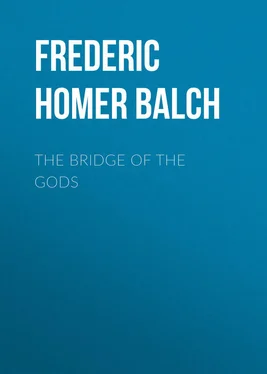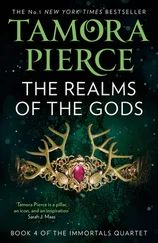Frederic Balch - The Bridge of the Gods
Здесь есть возможность читать онлайн «Frederic Balch - The Bridge of the Gods» — ознакомительный отрывок электронной книги совершенно бесплатно, а после прочтения отрывка купить полную версию. В некоторых случаях можно слушать аудио, скачать через торрент в формате fb2 и присутствует краткое содержание. ISBN: , Жанр: foreign_antique, foreign_prose, на английском языке. Описание произведения, (предисловие) а так же отзывы посетителей доступны на портале библиотеки ЛибКат.
- Название:The Bridge of the Gods
- Автор:
- Жанр:
- Год:неизвестен
- ISBN:http://www.gutenberg.org/ebooks/28815
- Рейтинг книги:3 / 5. Голосов: 1
-
Избранное:Добавить в избранное
- Отзывы:
-
Ваша оценка:
- 60
- 1
- 2
- 3
- 4
- 5
The Bridge of the Gods: краткое содержание, описание и аннотация
Предлагаем к чтению аннотацию, описание, краткое содержание или предисловие (зависит от того, что написал сам автор книги «The Bridge of the Gods»). Если вы не нашли необходимую информацию о книге — напишите в комментариях, мы постараемся отыскать её.
The Bridge of the Gods — читать онлайн ознакомительный отрывок
Ниже представлен текст книги, разбитый по страницам. Система сохранения места последней прочитанной страницы, позволяет с удобством читать онлайн бесплатно книгу «The Bridge of the Gods», без необходимости каждый раз заново искать на чём Вы остановились. Поставьте закладку, и сможете в любой момент перейти на страницу, на которой закончили чтение.
Интервал:
Закладка:
In obedience to the command, he told how he had thought of the unknown tribes beyond the Alleghanies, living in the gloom of paganism and perishing in darkness, till an intangible sympathy inclined him toward them, – till, as it seemed to him, their great desire for light had entered into and possessed him, drawing him toward them by a mysterious and irresistible attraction. He felt called of God to go and minister to their spiritual needs, and that it was his duty to leave everything and obey the call.
“Is this all?” he was asked.
He hesitated a moment, and then described his vision in the wood the morning of his wife’s death. It made a deep impression on his hearers. There was scarcely a man in the assembly who was not tinged with the superstition of the age; and all listened, not lightly or sceptically, but in awe, as if it brought them to the threshold of the supernatural.
When the narration was ended, the chairman requested him to retire, pending the decision of the council; but first he was asked, —
“Are you willing to abide by the decision of this council, whatever it may be?”
He raised his head confidently, and his reply came frank and fearless.
“I shall respect the opinions of my brethren, no matter how they may decide; but I shall abide by the will of God and my own convictions of duty.”
The grave Puritan bent his head, half in acknowledgment of the reply, half in involuntary admiration of its brave manhood; then Cecil left the room, the silent, watchful crowd that filled the aisles parting respectfully to let him pass.
“Now, brethren,” said the chairman, “the matter is before you. Let us hear from each his judgment upon it.”
Solemn and weighty were the opinions delivered. One brother thought that Mr. Grey had plenty of work to do at home without going off on a wild-goose chase after the heathen folk of the wilderness. His church needed him; to leave it thus would be a shameful neglect of duty.
Another thought that the Indians were descendants of the ten lost tribes of Israel, and as such should be left in the hands of God. To attempt to evangelize them was to fly in the face of Providence.
Another thought the same; but then, how about that vision of Mr. Grey? He couldn’t get around that vision.
“I don’t know, brethren, I don’t know!” he concluded, shaking his head.
Still another declared positively for Mr. Grey. The good people of the colonies owed it to the savages to do something for their religious enlightenment. It was wrong that so little had been done. They had taken their land from them, they had pushed them back into the wilds at the point of the sword; now let them try to save their souls. This man had been plainly called of God to be an apostle to the Indians; the least that they could do was to bid him Godspeed and let him go.
So it went on. At length the venerable chairman, who had twice turned the hour-glass upon the table before him, rose to close the discussion. His speech was a singular mixture of shrewdness, benevolence, and superstition.
He said that, as Christians, they certainly owed a duty to the Indians, – a duty that had not been performed. Mr. Grey wished to help fulfil that neglected obligation, and would go at his own expense. It would not cost the church a shilling. His vision was certainly a revelation of the will of the Lord, and he dared not stand in the way.
A vote was taken, and the majority were found to be in favor of ordination. The chairman pronounced himself pleased, and Mr. Grey was recalled and informed of the result.
“I thank you,” he said simply, with a glad and grateful smile.
“Now, brethren,” said the worthy chairman with much unction, “the hour of dinner is nigh at hand, and the good people of this place have prepared entertainment for us; so we will e’en put off the ceremony of ordination till the afternoon. Let us look to the Lord for his blessing, and be dismissed.”
And so with a murmur of talk and comment the council broke up, its members going to the places where they were to be entertained. Happy was the man who returned to his home accompanied by a minister, while those not so fortunate were fain to be content with a lay delegate. Indeed, the hospitality of the settlement was so bounteous that the supply exceeded the demand. There were not enough visitors to go around; and more than one good housewife who had baked, boiled, and roasted all the day before was moved to righteous indignation at the sight of the good man of the house returning guestless from the meeting.
Early in the afternoon entertainers and entertained gathered again at the meeting-house. Almost the entire country side was there, – old and young alike. The house was packed, for never before had that part of New England seen a man ordained to carry the gospel to the Indians. It occurred, too, in that dreary interval between the persecution of the Quakers and the persecution of the witches, and was therefore doubly welcome.
When Cecil arrived, the throng made way reverently for him. Was he not going, perchance like the martyrs of old, to the fagot and the stake? To those who had long known him he seemed hardly like the same man. He was lifted to a higher plane, surrounded by an atmosphere of sanctity and heroism, and made sacred by the high mission given him of God, to which was now to be added the sanction of holy men.
So they made way for him, as the Florentines had made way for “il Frate” and as the people of God had made way for Francis Xavier when he left them to stir the heart of the East with his eloquence, and, alas! to die on the bleak sea-coast of China, clasping the crucifix to his breast and praying for those who had cast him out.
Cecil’s face, though pale, was calm and noble. All his nature responded to the moral grandeur of the occasion. It would be difficult to put into words the reverent and tender exaltation of feeling that animated him that day. Perhaps only those upon whose own heads the hands of ordination have been laid can enter into or understand it.
The charge was earnest, but it was not needed, for Cecil’s ardent enthusiasm went far beyond all that the speaker urged upon him. As he listened, pausing as it were on the threshold of an unknown future, he wondered if he should ever hear a sermon again, – he, so soon to be swallowed by darkness, swept, self-yielded, into the abyss of savagery.
Heartfelt and touching was the prayer of ordination, – that God might accept and bless Cecil’s consecration, that the divine presence might always abide with him, that savage hearts might be touched and softened, that savage lives might be lighted up through his instrumentality, and that seed might be sown in the wilderness which would spring up and cause the waste places to be glad and the desert to blossom as the rose.
“And so,” said the old minister, his voice faltering and his hands trembling as they rested on Cecil’s bowed head, “so we give him into Thine own hand and send him forth into the wilderness. Thou only knowest what is before him, whether it be a harvest of souls, or torture and death. But we know that, for the Christian, persecutions and trials are but stepping-stones leading to God; yea, and that death itself is victory. And if he is faithful, we know that whatever his lot may be it will be glorious; that whatever the end may be, it will be but a door opening into the presence of the Most High.”
Strong and triumphant rang the old man’s tones, as he closed his prayer committing Cecil into the hands of God. To him, as he listened, it seemed as if the last tie that bound him to New England was severed, and he stood consecrated and anointed for his mission. When he raised his face, more than one of the onlookers thought of those words of the Book where it speaks of Stephen, – “And they saw his face as it had been the face of an angel.”
Читать дальшеИнтервал:
Закладка:
Похожие книги на «The Bridge of the Gods»
Представляем Вашему вниманию похожие книги на «The Bridge of the Gods» списком для выбора. Мы отобрали схожую по названию и смыслу литературу в надежде предоставить читателям больше вариантов отыскать новые, интересные, ещё непрочитанные произведения.
Обсуждение, отзывы о книге «The Bridge of the Gods» и просто собственные мнения читателей. Оставьте ваши комментарии, напишите, что Вы думаете о произведении, его смысле или главных героях. Укажите что конкретно понравилось, а что нет, и почему Вы так считаете.












